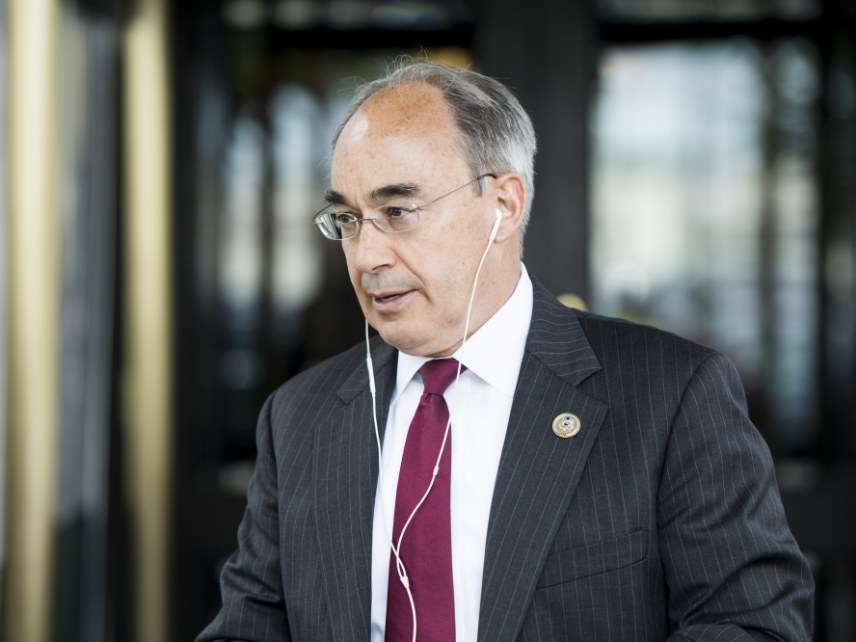Maine's GOP Congressman Sues to Stop Ranked-Choice Voting
Bruce Poliquin is currently ahead. But a new requirement that he get a majority vote could unseat him.

Maine Republican Congressman Bruce Poliquin has filed a federal lawsuit in hopes of stopping the state's implementation of a new voting method from wrecking his re-election chances.
In initial election returns, Poliquin is ahead of Democratic challenger Jared Golden, but just barely, 46 percent to 45 percent. The problem for Poliquin is that under Maine's new ranked-choice voting system, he has to surpass 50 percent in order to win. There are two other independent candidates in the race covering the spread between the two major party candidates.
Previously, those laggards would matter only in the sense they could spoil one of the front-runners' chances. But with ranked-choice, it's a bit different. Rather than choosing one candidate, voters are invited to rank the candidates in order of preference. If no candidate gets 50 percent, there's a retallying of the ballots where the candidate with the least number of votes is dropped. For those who voted for that candidate, their second choice (if they selected one) is tallied as their vote instead. And so it goes until one candidate gets a majority of the vote.
So even though Poliquin is leading, he could very well end up losing when the other two candidates are dropped out in following rounds of tallying. He and the Maine Republican Party have an interest in stopping ranked-choice voting in its tracks, even though voters approved the implementation of it via ballot initiatives (twice).
Today, Poliquin and a couple of Republican voters filed a suit claiming that this transition to ranked-choice voting violates the United States Constitution in an attempt to get a federal judge to stop the subsequent recounts.
The lawsuit (which can be read here) argues that implementing ranked-choice voting violates Article 1, Section 2 of the U.S. Constitution. That section sets up that members of the House of Representatives shall be elected by the people, though it does not specifically state how that election should be decided, whether through a majority or plurality.
The lawsuit takes note of a federal appeals court case from 1970, Phillips v. Rockefeller, involving a challenge to a U.S. Senate election in New York. In that case, a panel of judges ruled that when the authors of the Constitution wanted a majority vote to determine outcomes, they specifically stated so (as the Constitution does when referring to the electors choosing the president). If they do not, then historically only a plurality vote has been required to win a Congressional election.
But there's a notable difference with this case and what is happening in Maine. In the Phillips case, the plaintiff was challenging the results of the election because the winner, James L. Buckley, did not receive a majority of the vote. The plaintiffs were attempting to use the court to force through a change in how elections are run. The judges resisted for the above reason.
In Maine, though, the voters themselves decided through the ballot initiative process to require a majority vote for federal elections, and it's not really clear from that case that the judges are saying that a plurality must be the rule either. The conflict here appears to be whether the people of a state can decide for a higher threshold than plurality. In that, the U.S. Constitution is silent.
Maine's own state constitution is clear, though, in using the word "plurality" to determine who wins state-level races, so thus far ranked-choice voting is not being used to determine the ultimate winner of the governor's seat or state legislature seats, even though voters agreed to implement ranked-choice for those races as well. Right now, ranked-choice is being used only for federal races because the U.S. Constitution doesn't have a demand for plurality. Maine's top court has warned that lawmakers should change the state's own constitution to implement ranked-choice vote for state-level elections. They have not yet done so.
The attorney for the Committee for Ranked Choice Voting is asking to join the suit to try to argue against Poliquin's demand. John Brautigam said that ranked-choice voting implemented elsewhere have been upheld by state and federal courts and believes it will be upheld. In May, a federal judge declined a request from the state's GOP to stop the use of ranked-choice voting for the primary elections in June.
The Press Herald in Maine notes that it's not yet clear when the judge will take up this lawsuit. In the meantime, Maine's secretary of state's office is continuing with the vote tallying unless a judge orders them to stop.


Show Comments (68)